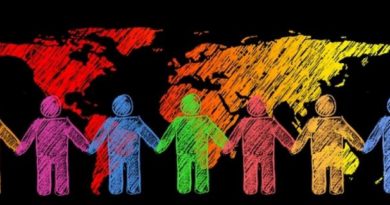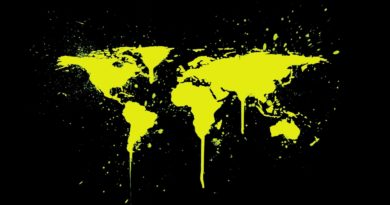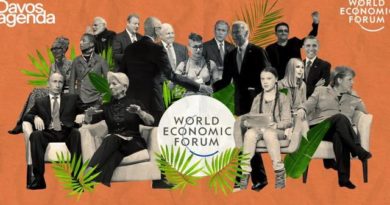What is the ‘Great Reset’ and how has Russia and Ukraine changed it? | Opinion

In June of 2020, three months into the pandemic, the leader of the World Economic Forum said that COVID-19 provided an urgent reason for the world to pursue a “great reset” of capitalism.
“The world must act jointly and swiftly to revamp all aspects of our societies and economies, from education to social contracts and working conditions,” Klaus Schwab wrote. “Every country, from the United States to China, must participate, and every industry, from oil and gas to tech, must be transformed.”
That sounds more like a command than a suggestion, which helps to explain why some conservatives were outraged at the prospect of America taking marching orders from an 83-year-old German economist.
Radio personality Glenn Beck, in particular, has been crusading against Schwab’s vision for a new kind of capitalism, which he calls “stakeholder capitalism.” And in January, Beck and co-author Justin Haskins published a book outlining their opposition to what they call “the movement that could finally snuff out the flame of liberty in America.”
Then something unexpected happened: Russia invaded Ukraine, and the conflict displaced COVID-19 as the world’s most urgent concern. But instead of sidelining conversation about the Great Reset, the Ukraine crisis has intensified it.
Here’s why a brutal military operation in Eastern Europe has some Americans worried about how it will affect their lives — whether or not the U.S. at some point gets drawn into the war.
I’ve said many times so far, “the bad stuff (of the Great Reset) hasn’t even started yet.” Well, now it’s beginning.
— James Lindsay, former intellectual (@ConceptualJames) March 6, 2022
While Beck is sometimes denounced as a conspiracy theorist who plays on people’s fear for ratings, a 2020 headline on the website of National Review said: “The Great Reset: If only it were just a conspiracy.”
In fact, Schwab and other proponents of the Great Reset are outspoken about their goals, which include swapping an economic system based on shareholders for one that includes disparate stakeholders, increased emphasis on environmental efforts and social responsibility, and increased global cooperation.
While the website of the World Economic Forum gives a nod to the late American economist Milton Friedman, some of its goals seem more in keeping with the politics of Bernie Sanders and Alexandria Ocasio-Cortez.
Of his vision, Schwab has written, “Irrespective of the details, the role of the state will increase, and in doing so, will materially affect the way business is conducted.” Taxes will also increase, he has said, “particularly for the most privileged.” He urges the world to work together on policies that will ensure “fairer, greener future.”
None of this is terrifying on the scale of, say, a military force storming your borders with the stated intent of decapitating your government. In fact, writing for National Review, Andrew Stuttaford pronounced the “The Great Reset” book written by Schwab and Thierry Malleret “dreary and appallingly-written,” something that seems to have “escaped from a PowerPoint presentation for a dismal corporate retreat.”
And Schwab has been hawking his ideas for decades, Stuttaford noted.
But Schwab realized, and rightly so, that there would be no return to “normal” after the pandemic, and that in the transition, there was an opportunity to intentionally reshape the new normal, not unlike the redrawing of nations’ borders at the end of World War I.
For Schwab and other Great Reset proponents, the pandemic presented a time to “build back better” — a line that, to most Americans, is the name of Joe Biden’s failed spending bill, but in fact is a World Economic Forum talking point.
Ironically, part of the agenda at last year’s gathering of the World Economic Forum in Davos, Switzerland, was focused on “building trust.” Clearly, the group has work to do in this regard, since the people most suspicious of the Great Reset have suggested that the pandemic was planned in order to bring about Schwab’s new world order and that COVID-19 and vaccines are a sinister form of population control.
With the number of COVID-19 cases and deaths in decline, at least in the U.S., the pandemic was beginning to recede in urgency when Russia invaded Ukraine in February. One might have thought talk of the Great Reset might have subsided then, too. But to many people, the invasion is another “serious crisis that cannot go to waste” for Great Reset proponents, as Beck said on his talk show this week.
“Make no mistake. You’re going to see the crunching of this economy and the collapse of the dollar,” he said.
Beck was speaking of Biden’s executive order, signed Wednesday, that called for a federal study of cryptocurrencies — digital assets, such as Bitcoin, that are not managed by governments. The order authorizes the creation of a “whole-of-government strategy” to protect consumers and national security and “address climate risks.”
But to Beck, the most disturbing part of the order was Biden’s directive to “urgently” explore a U.S. Central Bank digital currency, “a new digital dollar.”
The White House said it would place “urgency on research and development of a potential United States CBDC, should issuance be deemed in the national interest.” The White House didn’t spell out what circumstances would warrant the transfer to digital currency.
“This will mean the destruction of the dollar is coming. Your dollar,” Beck said, adding that gas prices, inflation and chaos in Ukraine are all creating opportunities for radical change.
“Everything, everything, about your life will be different soon,” Beck went on. “They’re going to make a transition away from the U.S. dollar to a digital currency, one that can be tracked, controlled, manipulated and designed for, in the words of the White House, equitable access to safe and affordable finance services. … (I)t will control you and your life, as well as remake all of society.”
Not everyone was so alarmed. The Wall Street Journal reported that the price of Bitcoin rose 9% and one industry insider said the anticipated regulation will help the industry grow as consumers would feel more confident. Some expressed surprise at the scope of the order, however.
“Leading up to this executive order, the narrative that had been circulating was that the administration was set to crack down on crypto. This executive order is a complete 180 from that. This is as close to an embrace of crypto as you could have hoped for from this Biden administration, if you’re pro-crypto,” Lee Reiners, executive director of Duke University School of Law’s Global Financial Markets Center, told The Wall Street Journal.
That, of course, is in line with what people warning about the Great Reset are saying: that we’re headed toward fascist controls that could include eventually involve a global digital currency.
Make no mistake, the “Infrastructure Bill” is about advancing The Great Reset agenda and part of that agenda is eliminating the private use of decentralized crypto to replace it with centralized, tracked and traced “Central Bank Digital Currencies”. https://t.co/Zzu4dHuxbn
— Derrick Broze (@DBrozeLiveFree) November 8, 2021
One of the most famous proponents of the World Economic Forum and its agenda is Prince Charles, who has said, “We have a golden opportunity to seize something good from this crisis.” He went on to say the pandemic’s “unprecedented shockwaves may well make people more receptive to big visions of change.”
With nebulous goals that more closely resemble a progressive agenda than anything put forth by the GOP, and an agenda that seems to be defined by an unelected German economist, it’s not surprising that conservatives are resisting anything that smacks of a Great Reset.
And while Beck may be seen by many as a catastrophizing ratings seeker, let it be known that he was right on the money on this: “Rapid inflation is a very real and dangerous possibility,” he wrote in “The Great Reset.”
This article has been archived for your research. The original version from Deseret News can be found here.


